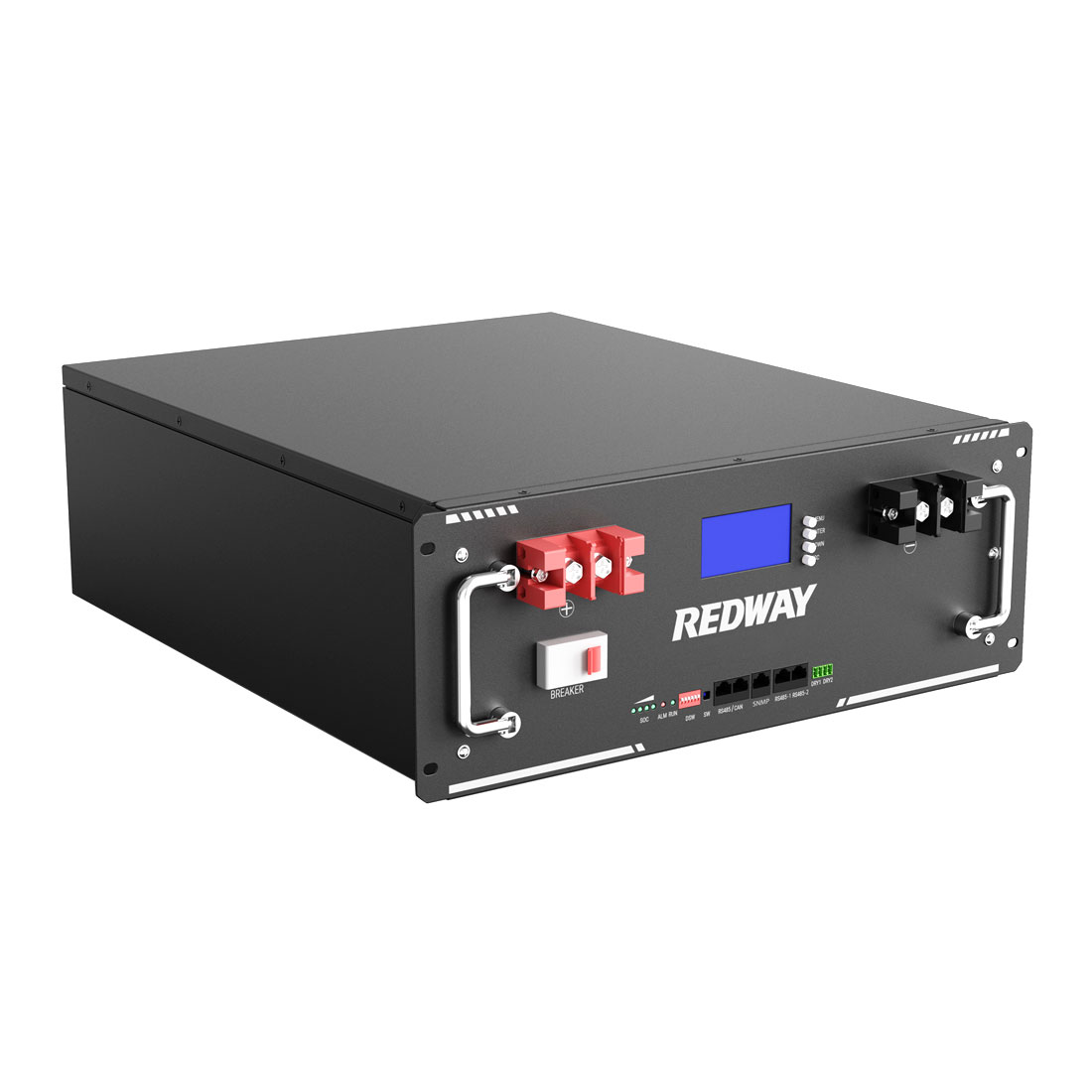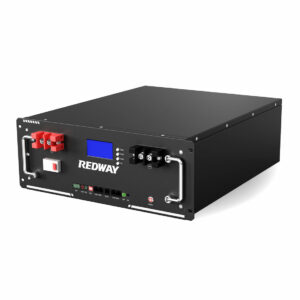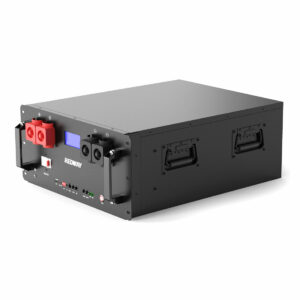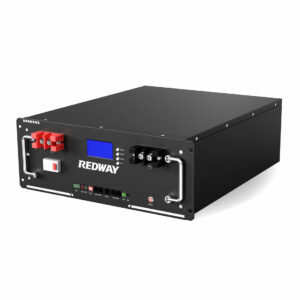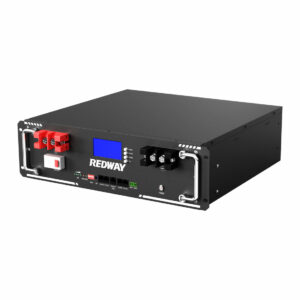Description
The 48V 150Ah Lithium Battery (RG48150P) is a robust energy storage solution tailored for OEMs, ODMs, and wholesale buyers in industrial, commercial, and renewable energy sectors. With a 7.2 kWh capacity, this battery powers Telecom Base Stations, C&I ESS, Data Centers, Hospitals, and Solar/ESS systems, delivering unmatched reliability and scalability for demanding applications.
Key Features
High Energy Density: Operating at 48V with 150Ah capacity, this lithium battery provides 7.2 kWh of energy, ideal for extended runtime in critical infrastructure.
Advanced Safety: Built with LiFePO4 cells and JBD Communication BMS, it ensures protection against overcharge, discharge, and temperature extremes.
Extended Lifespan: Over 8000 cycles at 80% DOD and a 20-year design life make it a cost-effective, long-term investment.
Scalable Configuration: Supports up to 16 parallel units (expandable to 32) for flexible energy expansion.
Customizable Integration: Optional upgrades include Bluetooth, App control, self-heating, CAN-bus, WiFi, 4G, and thermal aerosol fire suppression for tailored solutions.
Product Description
The 48V 150Ah Lithium Battery (RG48150P) combines cutting-edge LiFePO4 technology with industrial-grade durability. Measuring 550 x 440 x 178 mm (4U rack size) and weighing 54 kg, its compact design maximizes space efficiency while delivering high power density. The IP21-rated enclosure ensures safe indoor operation in harsh environments.
Equipped with SNMP and RS485 communication protocols, this battery seamlessly integrates with inverters like Deye, Victron, and Growatt. Its M6 terminals or optional ESS connectors simplify installation, while the LCD display and circuit breaker enhance user control.
Certified to UL1642, UL1973, IEC62619, CE, and UN38.3 standards, this lithium battery meets global safety and quality benchmarks. As a leading OEM manufacturer, we offer silkscreen branding and custom configurations to align with your brand and technical requirements.
Ideal for Telecom, Data Centers, and Hybrid Solar Systems, the 48V 150Ah Lithium Battery empowers businesses with reliable, scalable energy storage. Partner with us to deliver premium solutions for Europe, Asia, Africa, and beyond.
Telecom Lithium Battery Voltage and Applications
What voltage does the telecom lithium battery have?
Telecom lithium batteries typically operate at 48V nominal voltage, which is ideal for telecom infrastructure. The 48V configuration supports seamless integration with telecom rack systems, ensuring consistent power delivery and minimizing downtime in critical operations.
What is the capacity of the 150Ah rack-mounted battery?
The 150Ah rack-mounted battery delivers 7.2 kWh of energy storage at 48V. This high-capacity battery provides extended backup power for telecom systems, ensuring reliability during outages and minimizing power disruptions.
How does 4U size benefit rack-mounted battery installation?
The 4U size provides a compact design for rack-mounted battery systems. It optimizes space utilization in telecom cabinets while allowing easy integration with standard rack enclosures. The 4U form factor enhances thermal management and simplifies maintenance.
Does the battery support SNMP remote monitoring?
Yes, SNMP remote monitoring is supported, enabling real-time performance tracking of telecom lithium batteries. SNMP provides remote access to battery status, voltage, and fault conditions, allowing for proactive maintenance and minimizing downtime.
What telecom applications use 48V lithium batteries?
48V lithium batteries are used in telecom backup systems, 5G base stations, and remote communication sites. They ensure continuous power supply, enhancing network uptime and preventing disruptions in critical telecom infrastructure.
Are there safety certifications for lithium telecom batteries?
Yes, lithium telecom batteries comply with UL 1973 and UN 38.3 safety standards. These certifications guarantee the battery’s performance, thermal stability, and compliance with international safety regulations, ensuring operational reliability.
LiFePO4 Battery Features and Certifications for Telecom
What are key features of telecom rack-mounted LiFePO4 batteries?
Telecom LiFePO4 batteries offer high cycle life of over 6,000 cycles at 80% DOD and enhanced thermal stability. Their lightweight design, superior energy density, and integrated BMS ensure consistent power delivery for telecom applications.
Why choose LiFePO4 over other battery types for telecom?
LiFePO4 batteries provide superior safety and longevity compared to traditional lead-acid batteries. They feature high thermal stability, longer cycle life, and minimal maintenance, reducing the overall cost of ownership in telecom applications.
What telecom applications use rack-mounted LiFePO4 batteries?
Rack-mounted LiFePO4 batteries are used in telecom backup systems, remote base stations, and energy storage solutions. Their compact size and high energy density make them ideal for space-constrained environments.
Which certifications ensure LiFePO4 battery safety in telecom?
LiFePO4 batteries comply with UL 1973, IEC 62619, and UN 38.3 standards, ensuring safety and performance. These certifications guarantee thermal stability, mechanical durability, and resistance to electrical hazards.
How do OEMs customize LiFePO4 batteries for telecom needs?
OEMs customize LiFePO4 batteries by adjusting BMS settings, terminal configurations, and communication protocols. These customizations optimize battery performance to meet telecom-specific requirements and ensure seamless system integration.
What challenges face LiFePO4 battery adoption in telecom?
Challenges in LiFePO4 battery adoption include higher initial costs and the need for specialized installation protocols. However, the long-term benefits, including lower maintenance and extended lifespan, outweigh the initial investment.
48V 150Ah LiFePO4 Battery Applications and Lifespan
What is the application of 48V 150Ah LiFePO4 batteries?
48V 150Ah LiFePO4 batteries are used in telecom backup systems, renewable energy storage, and data centers. They provide consistent power for critical infrastructure, ensuring uptime and operational stability.
Why choose LiFePO4 over other battery chemistries?
LiFePO4 batteries offer higher thermal stability and longer cycle life than lithium-ion alternatives. Their safety, low maintenance, and resistance to thermal runaway make them ideal for telecom and industrial applications.
How does capacity affect telecom backup performance?
Higher capacity batteries extend backup duration during outages, ensuring uninterrupted telecom operations. A 150Ah LiFePO4 battery offers prolonged power supply, enhancing reliability in critical telecom infrastructure.
What is the lifespan of 48V 150Ah LiFePO4 batteries?
48V 150Ah LiFePO4 batteries have a lifespan of 6,000+ cycles at 80% DOD, providing over 10 years of reliable service. Their high durability makes them suitable for telecom and energy storage systems.
What safety features do LiFePO4 telecom batteries offer?
LiFePO4 batteries feature BMS protection against overcharge, over-discharge, and short circuits. They also include thermal management systems to prevent overheating and ensure operational safety.
How does 48V LiFePO4 compare to traditional backup batteries?
48V LiFePO4 batteries outperform lead-acid batteries by offering higher energy density, faster charging, and longer lifespan. They reduce maintenance costs and provide consistent power for telecom systems.
48V 150Ah Telecom Lithium Battery Specifications and Maintenance
What are the key features of 48V 150Ah telecom lithium batteries?
48V 150Ah lithium batteries offer high energy density and a cycle life of over 6,000 cycles at 80% DOD. They ensure consistent power supply, making them ideal for telecom backup systems.
How does lithium battery design improve telecom rack efficiency?
Lithium battery design enhances telecom rack efficiency by providing compact form factors, faster charging, and efficient thermal management. Their modular design allows for scalable power configurations.
What safety standards apply to custom 48V telecom batteries?
Custom 48V telecom batteries comply with UL 1973, UN 38.3, and IEC 62619 standards. These certifications ensure safety, thermal stability, and protection against electrical hazards.
What cycle life expectancy for 150Ah lithium telecom batteries?
150Ah lithium telecom batteries offer a cycle life of 6,000+ cycles at 80% DOD. This longevity ensures reliable power supply and minimizes replacement costs in telecom applications.
How to integrate 48V lithium batteries into existing telecom racks?
48V lithium batteries integrate easily with existing telecom racks through standard 4U or 5U enclosures. Their compact design and flexible BMS protocols ensure seamless system compatibility.
What maintenance requirements exist for telecom lithium battery systems?
Telecom lithium battery systems require periodic BMS diagnostics, firmware updates, and thermal inspections to ensure optimal performance. Regular monitoring prevents potential failures and extends battery lifespan.
SNMP-Enabled 4U Telecom Li-Ion Battery Features and Benefits
What are key features of SNMP-enabled 4U telecom Li-ion batteries?
SNMP-enabled Li-ion batteries provide remote monitoring, real-time diagnostics, and fault alerts. Their 4U rack-mounted design offers seamless integration into telecom infrastructures.
How does SNMP enhance battery monitoring in telecom applications?
SNMP protocols allow real-time monitoring of battery status, voltage, and fault conditions. This remote monitoring capability enables proactive maintenance and minimizes system downtime.
What are the advantages of Li-ion in 4U rack-mounted telecom batteries?
Li-ion batteries in 4U rack-mounted systems provide high energy density, fast charging, and long cycle life. Their compact design and modular scalability make them ideal for telecom applications.
How to integrate SNMP batteries with existing telecom infrastructure?
SNMP batteries integrate easily with existing telecom infrastructure through BMS communication protocols. Their plug-and-play design allows seamless connection to monitoring systems.
What safety certifications are required for telecom Li-ion batteries?
Telecom Li-ion batteries require UL 1973, IEC 62619, and UN 38.3 certifications. These standards ensure compliance with safety, thermal management, and operational durability requirements.
What maintenance practices optimize lifespan of SNMP-enabled telecom batteries?
SNMP-enabled batteries require regular firmware updates, thermal inspections, and diagnostic reviews. Proactive maintenance minimizes failures and extends the battery’s operational lifespan.
Telecom Grade 48V Lithium Batteries and Global OEM Solutions
What are telecom grade 48V lithium batteries used for?
Telecom grade 48V lithium batteries provide backup power for 5G base stations, remote communication sites, and data centers. They ensure continuous power supply during grid outages and peak loads.
Which telecom standards do 48V 150Ah lithium batteries comply?
48V 150Ah lithium batteries comply with UL 1973, UN 38.3, and CE standards. These certifications guarantee safe operation and adherence to international telecom regulations.
Why choose Chinese OEM factories for telecom batteries?
Chinese OEM factories offer customization, competitive pricing, and high-quality production. They adhere to international safety standards, ensuring reliable and efficient telecom battery solutions.
How does 48V 150Ah lithium battery cell technology work?
48V 150Ah lithium battery cells use LiFePO4 chemistry for superior thermal stability and cycle life. Their high energy density and advanced BMS protocols optimize power delivery in telecom systems.
What safety features do telecom lithium batteries include?
Telecom lithium batteries include BMS protection against overcharge, over-discharge, and thermal runaway. Their integrated thermal management systems ensure safe operation in high-demand environments.
How do 48V lithium batteries compare to other energy storage?
48V lithium batteries outperform lead-acid and VRLA batteries with higher energy density, longer lifespan, and faster charging. They reduce maintenance costs and improve system reliability in telecom applications.

